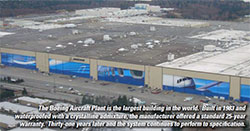Waterproofing warranties can be confusing, for the building owner as well as the contractor. There are product warranties offered by the manufacturer, performance warranties offered by the installer, legal terms, and lots of fine print. It’s no wonder they are one of the most misunderstood aspects of the waterproofing industry.
Too often, the only thing considered is the warranty’s length – which may be the least important part. While a warranty can be very beneficial, it does not guarantee a problem-free basement or roof.
Contractors and specifiers should understand the warranties on the products they recommend, and be able to explain them to customers, including the terms, limitations, and coverage.
Defining Terms
“Warranties, quite simply, are a guarantee from the company that the product being used will perform to the published standards,” says . Brian MacNeil, regional manager, North America at Kryton International. “A warranty allows the customer a peace of mind that the product they are purchasing is firmly backed by the company in a capacity consistent with claims around performance. It also builds mutual trust between the customer and manufacturer that the product will perform as described during the sales process.”
Keep in mind that a product warranty is different from a performance warranty or guarantee. For instance, Kryton has a standard product warranty that promises it’s integral crystalline waterproofing is “free from defects of manufacture and fully complies with the printed specifications contained in the product data sheets.” Any product proven defective will be replaced, or products will be provided to make the needed repairs.
Note that a product warranty doesn’t guarantee a waterproof structure, as there are many variables— suitability of the product for the job, jobsite conditions, applicator skill, etc.—that could lead to problems. If the owner wants a guarantee that the structure will be waterproof, he should insist on a so-called “performance warranty,” typically offered by the installation contractor.
Typically, at least four parties are involved in any waterproofing project: the specifier who chooses the material, the product manufacturer who makes it; the contractor or installer, and the building owner. In residential work, the installer is often the specifier. Each of these individuals should make sure their interests are protected.
“For the specifying community the most important term is the guarantee that every product is free from defects of manufacture and will perform to the specifications outlined in the presentation of the product,” says MacNeil. “Specifiers want a product that can perform to the standards agreed to, and if it doesn’t, they want to make sure that the situation is handled thoroughly and correctly without room for error.”
The applicator is typically most concerned with the level of support provided by the manufacturer, including product training and on-site technical advice. Since the contractor usually warranties the performance, it’s critical to have a manufacturer who will be at the applicator’s side every step of the way to ensure the final quality of the project.
Ron Greenbaum, a Ohio-based waterproofer known as “The Basement Doctor,” cautions that installers should be careful about offering performance warranties when other aspects of the project are outside their control. “For instance,” he says, ” you should not offer a floor warranty if you are waterproofing a thin floor slab. The perimeter system will not protect the homeowner from having water seepage through floor cracks, even if you seal them. Eventually, the sealant will fail and you will be left with an unhappy customer or put into a position where you are paying to replace a basement floor slab.”
“Similarly,” he goes on, “If you are waterproofing only a portion of the basement, it is not possible to offer a complete floor warranty. The warranty in this case should reflect the work being performed. In this instance, you should offer a wall/floor joint (cove) warranty only. Likewise, if you are installing a perimeter waterproofing system but not doing anything to the below grade masonry wall, you cannot offer a warranty on the wall. It is impossible to determine what debris may be in the wall (on block walls) so, even when you install weep holes in the block, the potential is there for wall seepage.”
Essentials
Be aware that some warranties are used more as a marketing tool to complete a sale, rather than a comprehensive measure between manufacturer and purchaser that the product will work to specifications. According to MacNeil, three essential aspects of a waterproofing warranty bear close scrutiny.
One is the conditions under which a valid warranty claim can be made. He says, “Some products come with a long-term warranty, but if you read the fine print, it excludes just about every possible condition that might ever happen.”
Many roof membrane warranties, for example, include exemptions for ponding water or gale-force winds.
Second, consider what the manufacturer or contractor is actually obligated to do in the event of a warranty claim. Will they replace the defective product, fix it, give you your money back, give you free repair materials, or partially or fully pay to make repairs?
MacNeil says, “Perhaps the most important aspect of any warranty is never written in the warranty at all – not even in the fine print. It is, ‘will the company be willing and able to honor the warranty over the warranty term?’
“Companies often go out of business. Sometimes they struggle with financial challenges. And occasionally a company will just decide to behave unethically. “Part of your assessment of a warranty’s value must include a hard look at the history, past behavior and likely future of the warranty giver,” he says.
Matthew Stock, at U.S. Waterproofing, agrees. “A warranty is only as good as the company that stands behind it. If they go out of business, their warranty means nothing. If they are a lesser known company, or even worse, have a poor reputation… you may be in your house longer than they actually stay in business! Do not be afraid to question a contractor on how long the company has been in business or for how long they’ve used a certain process.”
Limitations
Of course, contractors and manufacturers must include a few reasonable limitations to protect their ability to remain in business.
Greenbaum advises, ” Do not try to bury or hide things within your contract or paperwork. Ensure that everyone that interacts with the customer is clear on what your warranties are… Honesty is always the best policy.” He recommends that the limitations of a waterproofing warranty should be based on factors within your control.
For a contractor, Greenbaum says a normal disclaimer of liability would look something like this:
“Contractor assumes no liability for sewer line backups, consequential water or property damages, condensation, or water entering the premises through the chimney, conduit pipes, above soil levels or areas not specified in this agreement.
Contractor will not be responsible for any damages caused by mold, to include but not be limited to property damage, personal injury, loss of income, emotional distress, death, loss of use, loss of value, and adverse health effects, or any other effects.
This warranty does not cover, and the Contractor specifically disclaims liability for, water damage to floor coverings, furniture, stored items, finished walls, and other objects inside the foundation. “
Greenbaum says honesty should always be paramount. “Be up front with the customer and let them know what they can expect based on the solution that they choose. In some cases, homeowners may opt not to do all the required work. Be sure to document these instances and the repercussions of those decisions. It is always better to define clearly for the customer what they are and are not getting.”
Conclusion
A warranty is nothing more than a way to guarantee to the customer that the product (and possibly installation) is going to perform to the standards discussed during the purchasing process. Therefore, a good warranty should back this promise with terms to remedy the situation if the product (or installation) is defective.
Once this is understood, it becomes obvious that the length of coverage isn’t the most important aspect of a warranty, but just a part of the overall agreement. Stock says, “The bottom line is that basing a purchase solely on a warranty is a recipe for disaster. Hire the right company with the best solution and everything else will fall into place.”
Case Study: Boeing Aircraft Plant The Boeing Aircraft Plant in Everett, Wash., is the largest building in the world. With ceiling heights of 115 feet and more than 98 acres of conditioned space, it’s big enough that all of the Disneyland theme park and adjacent parking lots could fit comfortably within it.
The Boeing Aircraft Plant in Everett, Wash., is the largest building in the world. With ceiling heights of 115 feet and more than 98 acres of conditioned space, it’s big enough that all of the Disneyland theme park and adjacent parking lots could fit comfortably within it.
The original facility was constructed in 1966 to build the iconic Boeing 747, and expanded in 1983 to accommodate production of the then-new 777. When this expansion was being designed, waterproofing was a major concern. The facility is located in the Pacific Northwest, which receives abundant rainfall, and called for immense volumes of concrete.
The foundations measured six feet wide at the base, tapering to 4.5 feet wide at the top. In addition, there were 11,500 feet (more than two miles) of utility tunnels and an additional 6,500 feet of larger tunnels to accommodate utility mains and serve as emergency evacuation routes.
 At the time, sheet membranes had an average life expectancy of only five years, which would mean that, had the designers chosen this route, the waterproofing might have been replaced or extensively repaired six times or more between 1983 and the present.
At the time, sheet membranes had an average life expectancy of only five years, which would mean that, had the designers chosen this route, the waterproofing might have been replaced or extensively repaired six times or more between 1983 and the present.
Instead of using the sheet membranes, the construction team chose to use Kryton’s Krystol Internal Membrane. This crystalline waterproofing admixture was used to completely “tank” the massive building and removed the need for an externalmembrane or other waterproofing method.
Kryton provided the Boeing Aircraft Company with a standard 25-year warranty. Thirty-one years later and the system continues to perform perfectly to specification, saving the customer a significant amount of money—and hassles—over the decades.
Source: Waterproof! Magazine